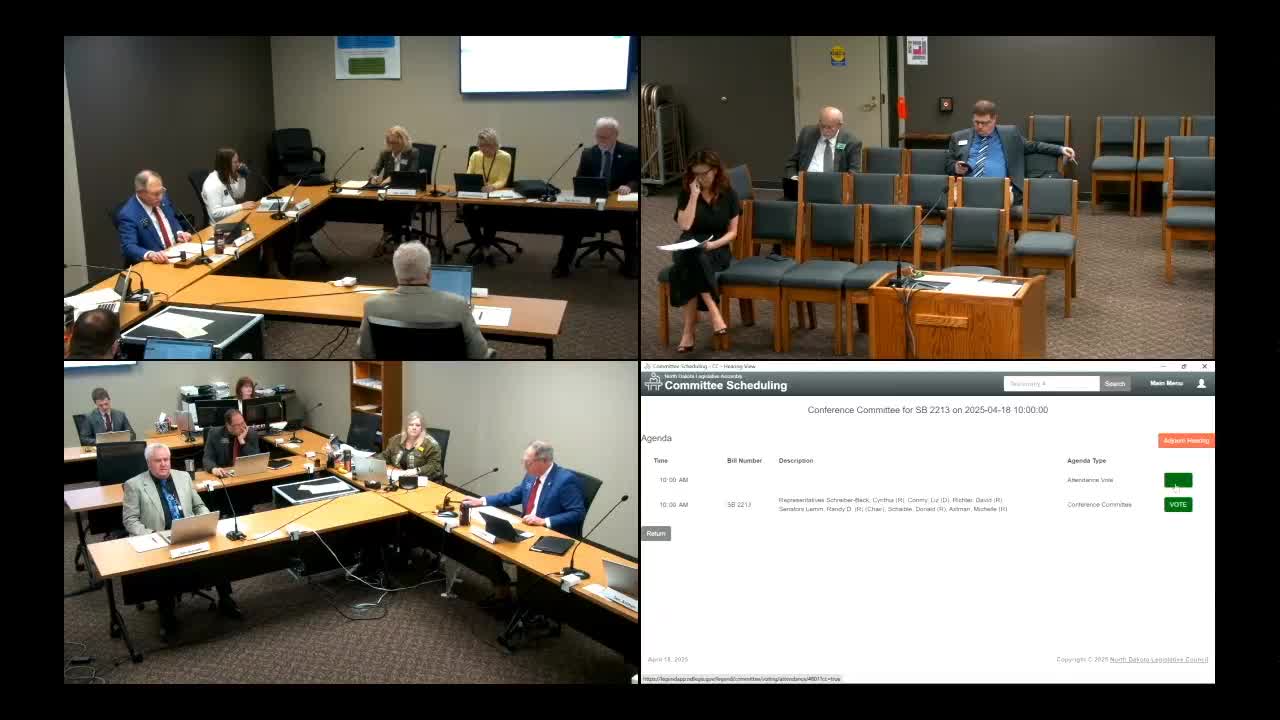Conference committee debates pilot to test math programs under SB 2213; superintendent seeks five-district trial
Get AI-powered insights, summaries, and transcripts
Subscribe
Summary
Members of the conference committee on Senate Bill 2213 heard from State Superintendent Kirsten Basler about a proposed state-funded pilot to test several math programs in five districts, including $100,000 per district for professional development and external evaluation; legislators questioned cost, timing and reliance on out-of-state examples.
The Conference Committee on Senate Bill 2213 discussed a proposed state-funded pilot to test math instructional programs in North Dakota, and State Superintendent Kirsten Basler asked the committee to fund a five-district trial with about $100,000 allocated per district for teacher professional development and external evaluation.
The pilot, Basler said, would follow a two‑phase model: a Department of Public Instruction screening phase to narrow vendors to three to five promising, content-specific mathematics programs, then a funded phase to support teacher training, substitute coverage and external evaluation in five districts to determine which approaches produce measurable gains. "Essentially we are looking at 5 schools or excuse me 5 districts. The allocation would be about a hundred thousand dollars for each school district that would be investing in professional development for our teachers," State Superintendent Kirsten Basler said.
Why it matters: The committee, meeting as a conference committee on SB 2213, is resolving differences between the Senate and House versions of the bill while weighing whether to include a pilot that would generate North Dakota–specific evidence ahead of any larger rollout. Basler and several legislators framed the pilot as a safeguard against districts spending limited local funds on costly programs that are not supported by implementation supports or North Dakota evidence.
Basler described the pilot as a response to a proliferation of commercial products marketed to districts and said the department would apply narrow criteria to reduce hundreds of candidates to a small set for head‑to‑head comparison and evaluation. "We will evaluate and measure and weigh them and so the department solely independently, they will have the providers ... the providers will have to prove that they're concrete ... not only the tools that they're in, that they're, that they have developed, but their program for supporting our teachers in the implementation," Basler said.
Some committee members questioned the state funding of what they described as vendor demonstrations. "I kind of think ... I don't know why the state should invest money for vendors to prove their products to us," said Senator Shibley, who urged the department to screen vendors and then recommend top options to districts without buying pilot access on their behalf. Basler replied that phase one of the plan is exactly that screening, and phase two would pay for the intensive professional development and implementation supports that vendors do not always provide or that districts cannot afford on their own.
Senator Axman expressed support for the pilot and for studying states that made historic gains in math, saying he did not consider the phrase "guinea pig" pejorative in this context: "If we are making them guinea pigs, it's only for the sole purpose of improving math scores amongst our students in the state." Representative Richter pressed for clarity on dollar figures and timelines, asking whether existing appropriations for professional development overlap with the pilot funding; Basler and committee members clarified that the bill contains a separate $1.2 million appropriation over two years ($600,000 per year) for statewide professional development while the pilot would be a distinct, smaller set of funded districts used to generate evidence.
Committee members also discussed implementation timing: section 8 of the bill sets effective dates for parts of the act, and "sections 2 and 4 ... become effective on 07/01/2027," a committee member noted. Basler said that the bill had been crafted with input from math and elementary teachers and REA directors, and that some delay in implementation was intentional to avoid overloading teachers currently involved in other professional development efforts.
No formal committee vote on the pilot was recorded in the transcript. The committee chair noted at the outset that the conference committee "did not concur with the House amendments," and the hearing concluded with the panel agreeing to continue discussions at a future meeting. The chair closed the hearing at about 10:30 a.m.
Background and context: Basler referenced other states (Alabama, Tennessee, Mississippi) that have reported gains using integrated programs and sustained professional development, and she cited North Dakota's earlier Science of Reading pilot (2019) and LETRS training as a past example where the department recommended a single program after piloting. "We recommended LETRS ... because we had run the Science of Reading pilot program in 2019 and LETRS came out clearly on top," Basler said, adding that adoption and implementation remain local decisions.
Next steps: The conference committee recessed to continue negotiations on SB 2213 and to address unresolved House amendments and the scope and funding of the proposed math pilot. The superintendent and committee members signaled further briefings and clarifications would be provided to finalize the bill language and appropriations.
